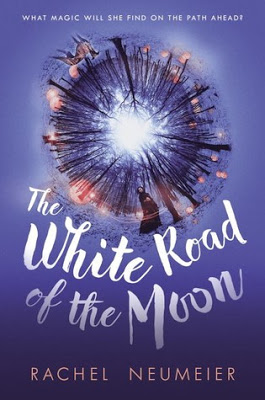Welcome to another session of Turning Pages!
Summer ‘flu is the pits, the absolute pits, so I’m lucky that, along with my cough drops and wads of tissues, I have a stack of great books.
I was introduced to the work of Rachel Neumeier during the 2016 Cybils, where I was a first-round judge for YA speculative fiction. I was so impressed with her left-of-center tale of a hidden princess, and made a quiet note to myself to seek out more of her work. I was expecting a similar tone to this book, but the feel is entirely different. It starts quietly and then the plot thickens like a good stew. There’s a lot going on, as in traditional high fantasy, a journey, a quest, a cast of characters to keep track of, but if you could come to grips with Patrick Rothfuss, Kristin Britain, Brian Sanderson, C.S. Lewis or Tolkien, you’ll be in fine shape for this.
Synopsis: Meridy Turiyn was eleven when her mother took the White Road of the Moon into death, and now, at fifteen, her cold, practical Aunt Tarana has apprenticed her to a soap-making washerwoman and is happy to be rid of her. Meridy, with her dark hair and eyes, is the village outcast. Dark-eyed Southerners like Meridy can see the quick dead – ghosts who remained in the real, anchored to the living whose love or hatred keeps them close, and the small, fair and blue-eyed villagers are terrified of them. Perhaps worse, Meridy is educated. She’s memorized the classic tales of the God, and poetry; her mind is stuffed with literature and art and all kinds of bits of history. Meridy has always wanted to travel, to see the world, to know, things which her practical aunt deems pointless, and her cousins mock as stupid. Staying in the tiny village where her mother is buried, where she is reviled and feared, was never going to be an option, but now that she’s expected to be a washerwoman, it’s impossible.
At the prompting of an storytelling ghost, Meridy leaves the tiny village and goes to seek her own way. When a ghost of a boy with a gorgeous ghost-dog directs her to an injured man, Meridy is prickly at their assumption that she can do anything for them, but she does what she can. It turns out to be just enough to embroil her in a mystery. The man and the boy need her for something – but neither will quite explain what, and Meridy doesn’t have time to fuss with figuring it out. She’s a girl alone on the road, and things are treacherous enough. But the mystery pursues her, putting her in the way of witch kings, ancient sorceries and a 200 year old injustice that is gathering momentum from the past. She’s just an over-educated village girl with dark eyes and a tendency to collect ghosts. How is she supposed to save a kingdom?
 Observations: This novel stays true to the trope of the “unexceptional loner with hidden depths.” Meridy is full of unexpected depths — really unexpected depths, but her lack of confidence and the chip on her shoulder at first hinder her from fulfilling her role in a game bigger than she can imagine, as forces from long-dead empires rise again. There are the equivalent of cryptic sages and romantically poetic knights — and Meridy’s irritation with the poetic speech and vague hints is a bit of fun. At one point she shrieks, “Can’t you speak like a normal person?” Well… actually, no. Welcome to high fantasy, lovey.
Observations: This novel stays true to the trope of the “unexceptional loner with hidden depths.” Meridy is full of unexpected depths — really unexpected depths, but her lack of confidence and the chip on her shoulder at first hinder her from fulfilling her role in a game bigger than she can imagine, as forces from long-dead empires rise again. There are the equivalent of cryptic sages and romantically poetic knights — and Meridy’s irritation with the poetic speech and vague hints is a bit of fun. At one point she shrieks, “Can’t you speak like a normal person?” Well… actually, no. Welcome to high fantasy, lovey.
High fantasy is not always terribly accessible; the worlds of C.S. Lewis and Tolkien are full of swords and sorcery, but also full of Arthurian Eurocentricism with its talk of white witches and impossibly ectomorphic fey in varying shades of blonde with violet eyes. While a reader doesn’t require lookalike protagonists to enjoy a work, consistent erasure of diversity throughout the traditional high fantasy canon has created imaginary worlds which seem to murmur Whites Only. Many times nonwhite readers can feel unwelcome in high fantasy, but Neumeier invites readers to identify with the main character – a black haired, dark-skinned, dark-eyed Southerner. Slightly scrappy, not especially pretty, Meridy has wild dark curls and a vast education that I’d imagine might provoke people to exclaim, “Wow, you’re so articulate! The assumption of her ignorance based on her class and coloring is just as insulting to Meridy as it is to those of us in the real world. In a subtle twist, it is only when Meridy sets aside her prickly pride and expectation of rejection and embraces her dark eyes and Southern heritage, it is only then that she can actually help anyone else.
I love the inclusion of faith in this novel. It is not a recognizable denominational faith, necessarily, but much of what Meridy accomplishes is based on faith – in herself, in the purposes of the God, and in those around her.
Conclusion: NB: This is a friendship novel, and does not contain romance.
This novel starts quietly and builds – as all quest/journey novels do. The scene is set very early in the book, with the rules of the world and its magical drawbacks in terms of ghosts, etc., and then, with those concerns taken care of, Meridy begins her evolution as a character Doing Things. Don’t give up reading those quiet, detailed beginnings! Especially with this novel, you will be rewarded.
I received my copy of this book courtesy of the public library, our greatest resource. You can find THE WHITE ROAD OF THE MOON by Rachel Neumeier at an online e-tailer, or at a real life, independent bookstore near you!
